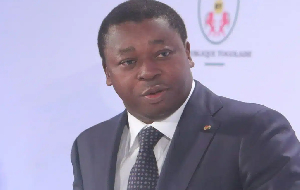 Togo President Faure Gnassingbe
Togo President Faure Gnassingbe
Acoalition of opposition parties and civil society organizations in Togo announced Monday that it plans to intensify both domestic protests and international advocacy in response to what it sees as a dangerous power grab by President Faure Gnassingbe.
The criticism follows Gnassingbe’s weekend appointment as head of a newly created executive council, a move that his opponents say amounts to a “constitutional coup” and threatens what remains of democracy in the West African nation, already grappling with regional instability fueled by military takeovers.
Gnassingbe, in power since 2005 after the death of his father, was installed Saturday as President of the Council of Ministers, a position created by recent constitutional reforms. The role allows him sweeping powers and the possibility of unlimited 6-year terms, all elected by Parliament rather than the public.
In a rare joint declaration Sunday, opposition parties the Democratic Forces for the Republic and the National Alliance for Change slammed the development, calling it a “constitutional coup.”
Watch a recent episode of The BreakDown podcast below and subscribe to our channel PanaGenius TV for latest episodes.
“This process is neither legal nor legitimate. It is the result of an institutional hold-up orchestrated by a desperate regime, which fears more than anything the freely expressed will of the people,” their statement read.
A demonstration was held in Lomé on Sunday in protest, though turnout remained relatively small.
Coalition spokesperson Professor David Dosseh told The Associated Press that the formal installation of Gnassingbe into the Council role represented “a new phase in the seizure of power,” and signaled further consolidation of authority after two decades in office.
The Gnassingbe family has dominated Togo’s political landscape for nearly six decades, first under Eyadema Gnassingbe and now his son Faure, who took over after contested elections in 2005.
In 2023, the younger Gnassingbe approved sweeping constitutional changes that scrapped direct presidential elections and transferred that authority to Parliament.
“This is not a transition. It’s the continuity of the same authoritarian system under another name after 58 years of rule,” said Dosseh, criticizing the rebranding of presidential leadership.
As part of the changes, a figurehead presidency has been introduced, currently held by 86-year-old Jean-Lucien Savi de Tové, a name unfamiliar to much of the population – while actual governing power rests with the council led by Gnassingbe, which now lacks term limits.
Requests for comment from the ruling party went unanswered. State-run media have framed the constitutional overhaul as a step toward parliamentary modernization and governance reform.
